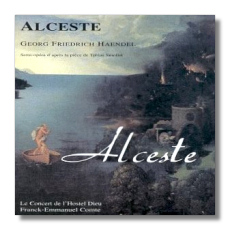
The Internet's Premier Classical Music Source
Related Links
- Handel Reviews
- Latest Reviews
- More Reviews
-
By Composer
-
Collections
DVD & Blu-ray
Books
Concert Reviews
Articles/Interviews
Software
Audio
Search Amazon
Recommended Links
Site News
 CD Review
CD Review
George Frideric Handel

Alceste - Incidental Music, HWV 45
- Stéphanie Révidat, soprano
- Roxanne Comiotto, soprano
- Jean Delescluse, tenor
- François Bazola, bass
Le Concert de l'Hostel Dieu/Franck-Emmanuel Comte
Absalon (Musisoft/Media 7) LCHD897 Recorded August 1997
Handel's Alceste has a curious history. Handel was in debt to John Rich, director of the Covent Garden theater, and in lieu of repayment agreed in 1749 to write the incidental music for an elaborate masque by Tobias Smollett, author of Roderick Random, Peregrine Pickle, and other novels. The project was abandoned for reasons now unknown, but probably because Rich decided that the risks of this expensive venture were too great for a work in a genre no longer popular. In its original form, its emphasis would have been on the speaking parts and the scenery and stage effects, with the music secondary. Handel, never one to waste anything, re-used most of the music in The Choice of Hercules, with the rest going into various oratorios.
The original score survives, but the libretto is lost and its author is unknown; it was probably based on a poem by Robert Lowth and may have been written by Thomas Morell, with whom Handel was closely associated at the time. It is easy enough to reconstruct the simple plot from the musical extracts and stage directions. Based on Euripides and closely resembling Quinault's libretto for Lully's Alceste, it centers on the mythological figures of Admetus, king of Thessaly, his wife Alceste, and the hero Hercules, who is staying at the Thessalonian court. The dying Admetus obtains a delay from Apollo on condition that someone else be sacrificed in his place, and Alceste volunteers. Hercules is so moved by her death that he rescues her from the underworld and returns her to her husband. The principal roles would have been taken by speaking actors; the music consists of orchestral introductions to the parts, dances, and set-piece arias and choruses setting the mood and commenting on the events of the play – e.g., two lovely sleep arias for Calliope, a rousing bass aria for Charon, and arias – almost all in da capo form – for the other soprano and the tenor. The level of musical inspiration is high throughout the piece.
The masque form is closer to the kind of tableaux vivant we find in operas by Lully and Rameau than to Handel's usual action- and emotion-filled dramas, and the French production of this performance accentuates the resemblance. The orchestra has a clearer, thinner, and reedier sound than we generally hear from English period instrument groups, and under Comte's direction it is responsive and effective. François Bazola has a splendid bass voice, rich and flexible in Charon's single aria ("Ye evening shades"), but his English pronunciation leaves much to be desired. Jean Delescluse is somewhat better on this score, and uses his typically French tenor – mainly head tones, forward projection, and a slightly nasal quality – with considerable coloratura skill. The two sopranos are excellent, and one of them (it isn't clear which) gives a particularly beautiful rendition of Callope's ode to sleep ("Gentle Morpheus").
This is high-grade Handel, thoroughly enjoyable, and warmly recommended.
Copyright © 1998, Alexander J. Morin


















